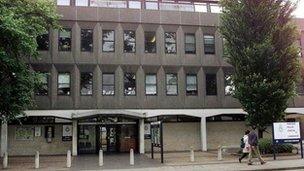Police and crime commissioner elections: Cambridgeshire
- Published

Parkside Police Station in Cambridge
On 15 November 37 police and crime commissioners will be elected in England along with four in Wales.
The PCCs, as they will be known, will be tasked with scrutinising their force and holding it to account. They will also be able to hire and dismiss the chief constable and set the force's budget.
The commissioners will be paid and are supposed to empower local people into having a say on how crime is tackled in their area.
Nominations for candidates in Cambridgeshire have now officially closed.
BBC News has taken a look at each of the police forces ahead of the elections.
Cambridgeshire Police
Cambridgeshire Constabulary has 1,377 officers, after losing 77 last year. It has 174 officers per thousand of population, which is the second lowest in the region. There are six Police and Crime Commissioner candidates standing at present and they will have to deal with some of the challenges outlined by former Chief Constable, Julie Spence. She warned two years ago that if cuts to the police service continue, it could face "Armageddon". Two years before that she had named the county as one of a number of areas under pressure because of the rise in migrant workers, which had increased the force's bill for translation services significantly. More recently, plans to merge Cambridgeshire's traffic police with Bedfordshire & Hertfordshire, meaning fewer officers on the road, have proved controversial.
About 1,400 officers and 200 Police Community Support Officers (PCSOs) cover an area of more than 1,350 sq miles (3,500 sq km) of Cambridgeshire and Peterborough.
The resident population is approximately 700,000, but there is also a large migrant worker community employed mainly in agriculture and food production industries.
Cambridge also attracts more than four million visitors each year.
The force's local policing model divides Cambridgeshire into six areas, in line with local authority boundaries and includes Peterborough, Fenland, Huntingdonshire, East Cambridgeshire, South Cambridgeshire and Cambridge city.
Cambridgeshire Police is led by Chief Constable Simon Parr who was appointed in September 2010. He is also responsible for the co-ordination of emergency procedures across UK police forces and chairs the UK policing Business Design Authority.
Mr Parr is supported by John Feavyour who was appointed Deputy Chief Constable in December 2006.
The force's priorities include maintaining local police performance, delivering policing within the available budget, reducing crime and disorder, keeping people safe and maintaining the "resilience of protective services" enabling the force to deal with incidents both regionally or nationally while maintaining "business as usual".
Funding
Cuts to police budgets following the government spending review in 2010 left Cambridgeshire Police with a £6m gap in 2011-12 and a need to save a further £10m by 2015.
Essentially the force has to cut its budget by 20% by 2015, which Mr Parr admitted would make policing "more challenging over the next year or two".
The budget for policing the county in 2011-12 is £130.5m. Two thirds of this comes from the government, and the rest from council tax payers.
The Police Authority has included a 2% increase in council tax in its planning assumptions for 2012-13.
In order to make necessary savings, Cambridgeshire Police has formed a strategic alliance with Bedfordshire and Hertfordshire Constabularies.
The move is expected to deliver an estimated £15m in savings across the three forces each year by the end of 2015-16.
Initially the forces are examining ways of working together on major crime investigation, professional standards, contact management and firearms.
They are also considering outsourcing some services including IT, finance and human resources to private security firm G4S.
As part of the savings the force announced in October it would cut 38 senior officers.
Crime and performance
According to Home Office figures for the 12 months to September 2011, Cambridgeshire Police was one of five in England and Wales to have recorded a drop in crime of 10% or more.
Robberies in Cambridgeshire fell by 34% - a result described by a police spokesman as "particularly dramatic".
There was a 38% increase in the number of drug offences which police put down to the force's "tough approach".
Chief Constable Simon Parr said the overall crime reduction represented 6,000 fewer victims in Cambridgeshire.
Data published by the Office for National Statistics shows the constabulary dealt with 51,658 recorded crimes during 2011-12.